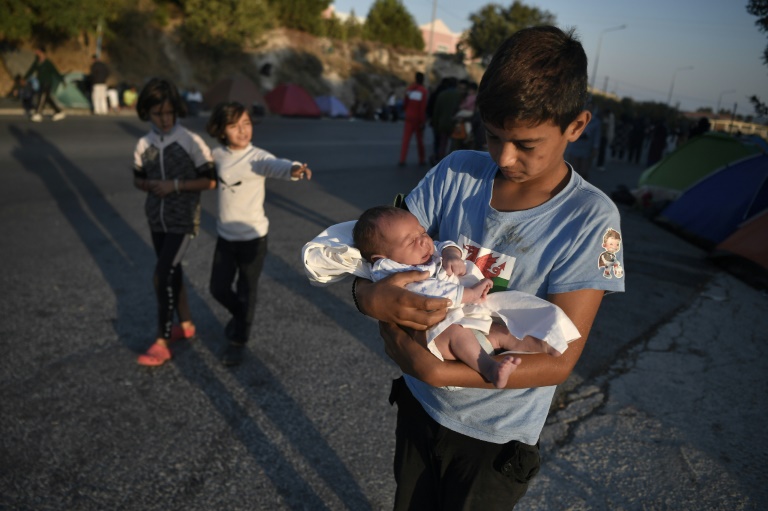
LESBOS ISLAND, Greece: Greek security forces arrived en masse on the island of Lesbos on Friday to help build a new shelter for thousands of migrants left homeless by fires that destroyed their camp this week.
Many desperate families wandered listlessly in the streets of the island's main town after spending a third night sleeping out in the open, on the sides of streets, parking lots or even at petrol stations.
"We've suffered here for three days," Congolese asylum seeker Patricia Bob told AFP on the side of a road, sitting on a piece of cardboard serving as her mattress.
"We are hungry and thirsty, we have no toilets or showers."
The Greek miltary began helping to set up a replacement site on a hilltop army firing range near the burnt-down camp, but had to use helicopters to bypass roadblocks set up by locals opposed to rehousing the migrants on the island.
Some 11,500 asylum seekers including 2,200 women and 4,000 children are without adequate shelter, the UN refugee agency said Friday, following the fires on Tuesday and Wednesday that gutted the Moria camp.
Charities squeezed
Eleven police vehicles — some stopping the migrants from reaching a nearby port — and two water cannon boosted the heavy presence seen on the island since the devastating blazes.
The heavy police presence has complicated efforts by volunteer groups to give the hapless asylum seekers assistance.
"The police blocked several roads... there is no clarity in the government's plan and the situation remains chaotic," Faris Al-Jawad, a spokesman for medical charity MSF, told AFP.
"We started cooking pasta, and at the same time a small car with Spanish volunteers came with 300 packages of food," added Salam Aldeen of Team Humanity.
"They told us they had to smuggle themselves in and it took hours... we had very hard time to get the aid in."
The additional police forces are also there to prevent local hardliners from causing trouble. In February, efforts to build a new camp on Lesbos sparked days of clashes.
Officials have blamed migrants for the fires, the first breaking out shortly after 35 people tested positive for coronavirus and were facing isolation measures.
The government is desperate to prevent a more widespread infection among the island of 85,000 people. Only eight of the positive cases have been tracked down so far.
Germany plea
The plight of the stranded families has prompted other European countries to offer to take in hundreds of asylum seekers, particularly unaccompanied youngsters.
The Moria camp, one of dozens built in Greece following the influx of people to Europe in 2015, was notoriously overcrowded — often housing more than four times its intended capacity — and became a lightning rod for local discontent.
Greece has long complained that, aside from providing funds, its EU partners have done too little to help.
An EU-wide asylum system fell apart under the strain of hundreds of thousands of arrivals, with other European nations accepting only a trickle of refugees, leaving thousands remaining trapped in Greek camps.
Germany has used the fire to call for more solidarity in Europe and along with France agreed an initiative on Thursday for EU states to share out the roughly 400 unaccompanied children and young people from the camp.
"As a preliminary step we are offering to Greece to accept refugees who are minors — other steps must follow," German Chancellor Angela Merkel told a panel discussion in Berlin.
The European Union must "assume more shared responsibility" for migration policy, Merkel said, addressing longstanding complaints of Greece and other southern nations.
While several EU states have agreed to take in the young migrants, including Germany, France, the Netherlands and Finland, Belgium refused and Denmark said it would send money instead.
European Commission vice-president Margaritis Schinas, who visited Lesbos on Thursday, said additional ships financed by the EU would provide shelter to those most in need.
Greece's conservative government has toughened its asylum restrictions, slashing cash benefits and accommodation provisions to discourage further migration.
The government has also passed a law aiming to limit the access of NGOs and charities to the camps and boost official control.